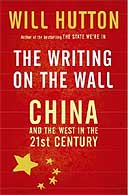
The Writing on the Wall: China and the West in the 21st Century
by Will Hutton
Little, Brown £20, pp431
Everyone agrees that China is the great economic success story of the past decade and that adapting to its rise will pose a challenge to the political, economic and even moral bases of the current international order. Whether a successful China behaves like Bambi or Godzilla - Chicago political scientist John Mearsheimer's happy formulation (his money is on Godzilla) - it will have an impact on the security architecture of Asia and the Far East, on the global economic system, on competition for scarce resources and on less material factors such as the global promotion of human rights.
Here, the 'China effect' can be seen already in Africa where, just at the point when Western states and firms are beginning to challenge corrupt African elites, China is offering 'no questions asked' business and trade deals. But an unsuccessful, resentful China would be far more disruptive. At least a successful China would have a stake in the existing order; a nuclear-armed 'failed state' with China's ability to upset the apple cart is a frightening prospect. So, the most important question is really not how the system can adapt to China's success, but, rather, whether China can continue to grow at its current spectacular rate without eventually collapsing even faster.
Half of Will Hutton's book is devoted to this question. Some oversimplified potted history aside, his case is persuasive; chapter 6, 'The Economic Impossibility of the Halfway House', in particular ought to be compulsory reading for concerned citizens and scholars alike.
His thesis, which I find compelling, is, first, that Chinese growth is built on an unsustainable model - impossibly high levels of export growth largely driven by assembling half-completed imported goods, plus state-driven capital accumulation and cheap labour, with very low productivity, little technical innovation and the absence of an appropriate business culture or legal structure.
Second, that doing anything to put this right is going to involve changes that will be threatening to the political control of the Communist party, the continuation of which has been the central aim of the country's political elite since the death of Mao. Essentially, Hutton argues, the Chinese will have to import what he calls the 'soft infrastructure of capitalism': security of property, representative government, an independent civil society, a commitment to civil and political rights and a business culture that is not solely driven by the desire for personal enrichment. In other words: 'It's the Enlightenment, Stupid', another lapidary chapter heading.
The other half of the book is devoted to showing how these very Enlightenment values have been betrayed during the Thatcher/Reagan/Blair/Bush years by an Anglo-American political elite that has lost its way, bought into neoliberal economic policies wholesale, undermined the rule of law at home and abroad and generally fallen into decadence. Readers of any other book by Hutton will not need to have this argument rehearsed, and will see it either as a robust statement of the obvious or as a predictable overreaction to some admittedly troublesome policies. Either way, the chapters in which Hutton unfolds this side of the argument have very little value added.
Interestingly, one side-effect of this dimension of the book is a generally America-centric view of the world. Viewed from Washington, China's rise poses unique and unprecedented problems/opportunities, but from a global perspective, the rise of India as an economic power may be as significant. Here, we have a rapidly growing giant with a strong business culture, high levels of productivity and technical innovation and a general commitment to Enlightenment values, values that most of its elite have made their own.
Perhaps because it poses fewer challenges for the US, Hutton devotes only a few pages to India; he notes the positives, but condemns the caste system, gender inequality and rural illiteracy. Fair enough, but this raises another question: rates of female literacy in the countryside might be higher in China than in India, but we have only the word of the Chinese government for this. Hutton is rightly sceptical of Chinese business accounting, but mostly takes on trust government statistics on the welfare of the Chinese people - unwisely, given the precedent of the wholly false figures produced by eastern European communist regimes.
Returning to the overemphasis on America, what of the EU's reaction to China's rise? US protectionism is, rightly, slammed, but there is barely a word of criticism of the EU, probably because of Hutton's commitment to the European social model. The Chinese welcome European power as a counterweight to the US, but I doubt whether they are so forgiving of European trade policy towards China. This is a good book, which would have been even better had the author kept the focus on contemporary China rather than allowing his domestic political agenda to shape so much of the argument.
· Chris Brown is professor of international relations at the London School of Economics

